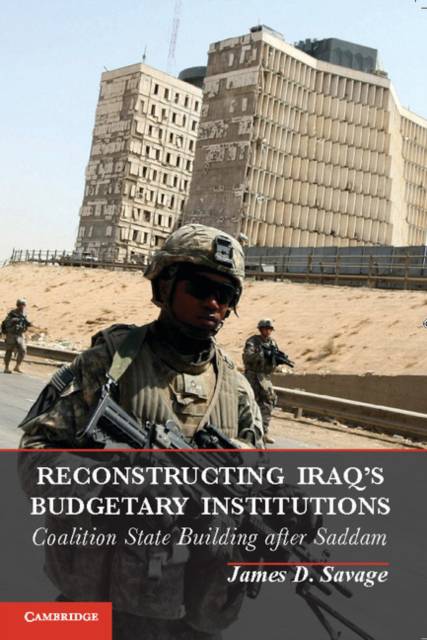
Door een staking bij bpost kan je online bestelling op dit moment iets langer onderweg zijn dan voorzien. Dringend iets nodig? Onze winkels ontvangen jou met open armen!
- Afhalen na 1 uur in een winkel met voorraad
- Gratis thuislevering in België vanaf € 30
- Ruim aanbod met 7 miljoen producten
Door een staking bij bpost kan je online bestelling op dit moment iets langer onderweg zijn dan voorzien. Dringend iets nodig? Onze winkels ontvangen jou met open armen!
- Afhalen na 1 uur in een winkel met voorraad
- Gratis thuislevering in België vanaf € 30
- Ruim aanbod met 7 miljoen producten
Zoeken
Reconstructing Iraq's Budgetary Institutions
Coalition State Building after Saddam
James D Savage
Hardcover | Engels
€ 164,45
+ 328 punten
Omschrijving
The invasion of Iraq led to a costly nine-year state-building and reconstruction effort. Reconstructing Iraq's budgetary institutions proved to be a vital element of the state-building project, as allocating Iraq's growing oil revenues to pay salaries and pensions, build infrastructure, and provide essential public services played a key role in the Coalition's counterinsurgency strategy. Consistent with the literature on state building, failed states, peacekeeping, and foreign assistance, this book argues that budgeting is a core state activity necessary for the operation of a functional government. Employing a historical institutionalist approach, this book first explores the Ottoman, British, and Ba'athist origins of Iraq's budgetary institutions. The book next examines American pre-war planning, the Coalition Provisional Authority's rule making and budgeting following the invasion of Iraq in 2003, and the mixed success of the Coalition's capacity-building programs initiated throughout the occupation. The budgetary process introduced by the Coalition offered a source of institutional stability in the midst of insurgency, sectarian division, economic uncertainty, and occupation. This book sheds light on the problem of "outsiders" building states, contributes to a more comprehensive evaluation of the Coalition in Iraq, addresses the question of why Iraqis took ownership of some Coalition-generated institutions, and helps explain the nature of institutional change.
Specificaties
Betrokkenen
- Auteur(s):
- Uitgeverij:
Inhoud
- Aantal bladzijden:
- 299
- Taal:
- Engels
Eigenschappen
- Productcode (EAN):
- 9781107039476
- Verschijningsdatum:
- 20/01/2014
- Uitvoering:
- Hardcover
- Formaat:
- Genaaid
- Afmetingen:
- 155 mm x 231 mm
- Gewicht:
- 589 g

Alleen bij Standaard Boekhandel
+ 328 punten op je klantenkaart van Standaard Boekhandel
Beoordelingen
We publiceren alleen reviews die voldoen aan de voorwaarden voor reviews. Bekijk onze voorwaarden voor reviews.











